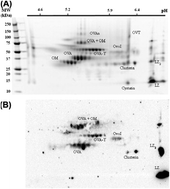Egg proteins as allergens and the effects of the food matrix and processing
Abstract
Hen eggs are an important and inexpensive source of high-quality proteins in the human diet. Egg, either as a whole or its constituents (egg yolk and white), is a key ingredient in many food products by virtue of its nutritional value and unique functional properties, such as emulsifying, foaming, and gelling. Nevertheless, egg is also known because of its allergenic potential and, in fact, it is the second most frequent source of allergic reactions, particularly in children. This review deals with the structural or functional properties of egg proteins that make them strong allergens. Their ability to sensitize and/or elicit allergic reactions is linked to their resistance to gastroduodenal digestion, which ultimately allows them to interact with the intestinal mucosa where absorption occurs. The factors that affect protein digestibility, whether increasing it, decreasing it, or inducing a different proteolysis pattern, and their influence on their capacity to induce or trigger an allergic reaction are discussed. Special attention is paid to the effect of the food matrix and the processing practices on the capacity of egg proteins to modulate the immune response.


 Please wait while we load your content...
Please wait while we load your content...